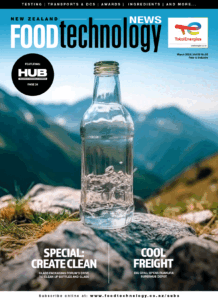Polished cow water plays part in ‘cleaner’ dairy processing
 The dairy processing industry is feeling increasing pressure globally to improve its environmental performance. The key drivers for change in New Zealand are changes in legislation, the need to remain competitive in trade negotiations and customers’ concerns about the environmental footprint of the products they are purchasing.
The dairy processing industry is feeling increasing pressure globally to improve its environmental performance. The key drivers for change in New Zealand are changes in legislation, the need to remain competitive in trade negotiations and customers’ concerns about the environmental footprint of the products they are purchasing.
Water plays a huge part in this. The New Zealand dairy industry’s commitment to decrease the aquatic impact of dairy for the last two decades goes beyond the farm gate, to our dairy food production lines.
“We are working closely with some of the country’s top dairy process managers to reduce their water footprint, to become more self-sufficient and less reliant on municipal water to run their plants,” says Brent Marshall, director of Smart Membrane Solutions – a membrane filtration original equipment manufacturer (OEM) based in Rolleston, Canterbury.
“Reusing the condensate from the drying process is a viable way to achieve both and reduce operational costs at the same time.
Often referred to as cow water, Marshall says that the evaporator condensate from processes like milk powder production represents a significant volume of water that is ideal for reuse in the same process that creates it.

Testing water purity after RO filtration process
FT November24 Pages “The use of RO membranes for recovering cow water extracted during processing represents a major advancement in dairy sustainability. The re-usable component can be over 90% of the volume produced during processing. With the correct filtration, it requires less treatment than fresh water coming in from the municipal water supply, plus it’s free,” says Marshall.
“By reclaiming this valuable resource, dairy processors can significantly reduce their water consumption, lower operational costs, and minimise their environmental footprint.”
Simple steps towards
more sustainable dairy processing
As specialists in dairy food and beverage membrane technology improvements, Smart Membrane Solutions has built a design modification that can be retrofitted to any plant for this purpose. With a simple two-step filtration process, the RO water is made suitable for re-use for CIP rinse waters and, with one further step, can be used as boiler feed water to generate steam for heating and drying.
RO filtration is the molecular sieving process that demineralises water – producing a ‘polished’ water that is soft enough without undergoing the same treatment required when introducing ‘new’ water from ground water bores or a municipal supply.
Sustainability goals of dairy processing clients
Dairy processors are being challenged to conserve water, not only by reducing site uptake freshwater consumption but also by using measures to reuse water. However, they have to do so without compromising the hygienic quality and safety of the products. The re-use of polished cow water addresses all three criteria. The RO filtration process is physical, not chemical, which meets with international food safety standards.
“Water that has undergone RO filtration is softer and cleaner than fresh water. In fact, it’s only one step away from meeting the criteria for drinking water,” says Marshall.

Example of Smart Membrane Solutions set up
The conversations he and his team are having with their clients are showing that the reuse of water is driven by economic and environmental considerations: “Around 85% of milk is water – they want to re-use it and show the world that they are making use of that water responsibly.”
By highlighting to dairy processors both the operational and environmental advantages of using RO membranes for cow water recovery, they can better understand the benefits of integrating this technology into their processes.
Global thirst
On a global level, explains Marshall, the industry’s thirst for water reuse is growing. Recent developments in international dairy industries show a shift towards greater circularity and sustainability.
The EU dairy sector is among those leading this shift, establishing a resilient infrastructure that promotes sustainable methods of production and fosters an environment of innovation. This is triggering the development of technologies and processes that can increase competitiveness within the EU as well as with other countries where such projects also take place.
“If New Zealand’s dairy processors want to keep up, as an industry we need to be seeking innovations in the sustainable space.”
Marshall believes that as membrane technology continues to evolve, the potential for water recovery in dairy operations will only increase and offer exciting opportunities for New Zealand manufacturers such as Smart Membrane Solutions to compete in the international arena alongside New Zealand’s top dairy processors.
Sponsored content: For more information phone +64 3 7411808, email [email protected] or visit


































































































